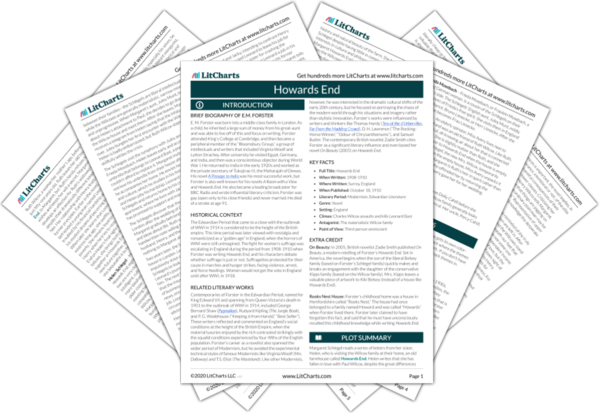Class and Privilege
Howards End, set in England in the early 1900s, follows three seemingly incompatible families, the Schlegels, the Basts, and the Wilcoxes, as they pursue intellectual and material advancement in a nation that is theoretically becoming more democratic. Author E. M. Forster illustrates the stark contrasts between the lives of those born into wealth, like the Schlegels, and those born into poverty, like the Basts. In revealing England’s impoverished underbelly—a tragic, unsavory reality that most…
read analysis of Class and PrivilegeCapitalism
As a novel set in turn-of-the-century England, a time of ongoing industrialization and urbanization, Howards End criticizes the capitalist forces behind England’s prosperity. A society solely driven by the free market, purely intent on maximizing profit and opposed to any kind of intervention, promotes cold self-interest and the consolidation of power while producing extreme suffering in the masses. Through the unfortunate fates of Leonard and Jacky Bast, Forster demonstrates how difficult it is for…
read analysis of CapitalismColonialism and Imperialism
The Edwardian era (approximately 1901–1910) during which Forster wrote Howards End is widely considered to be the last period of English global supremacy, before the country would be devastated by two world wars and would reluctantly relinquish her authority over her vast overseas colonies. Forster subtly critiques the subjugation of foreign territories and populations that granted England her supposed preeminence, describing the temptation of and justification for imperialism as well as illustrating its inherent flaws.
…
read analysis of Colonialism and Imperialism
Gender
Forster’s wide-reaching social commentary in Howards End includes a sharp critique of sexism as artificial and groundless, but powerfully persistent nonetheless. He shows his female characters to be more than equal to many men in intelligence, bravery, and conviction, contrary to popular belief in women’s inferiority to men. Treating them differently is thus absurd and wrong. Nevertheless, society’s irrational sexism can be extremely difficult to effectively recognize, resist, or reason with. Margaret loves her husband…
read analysis of Gender






